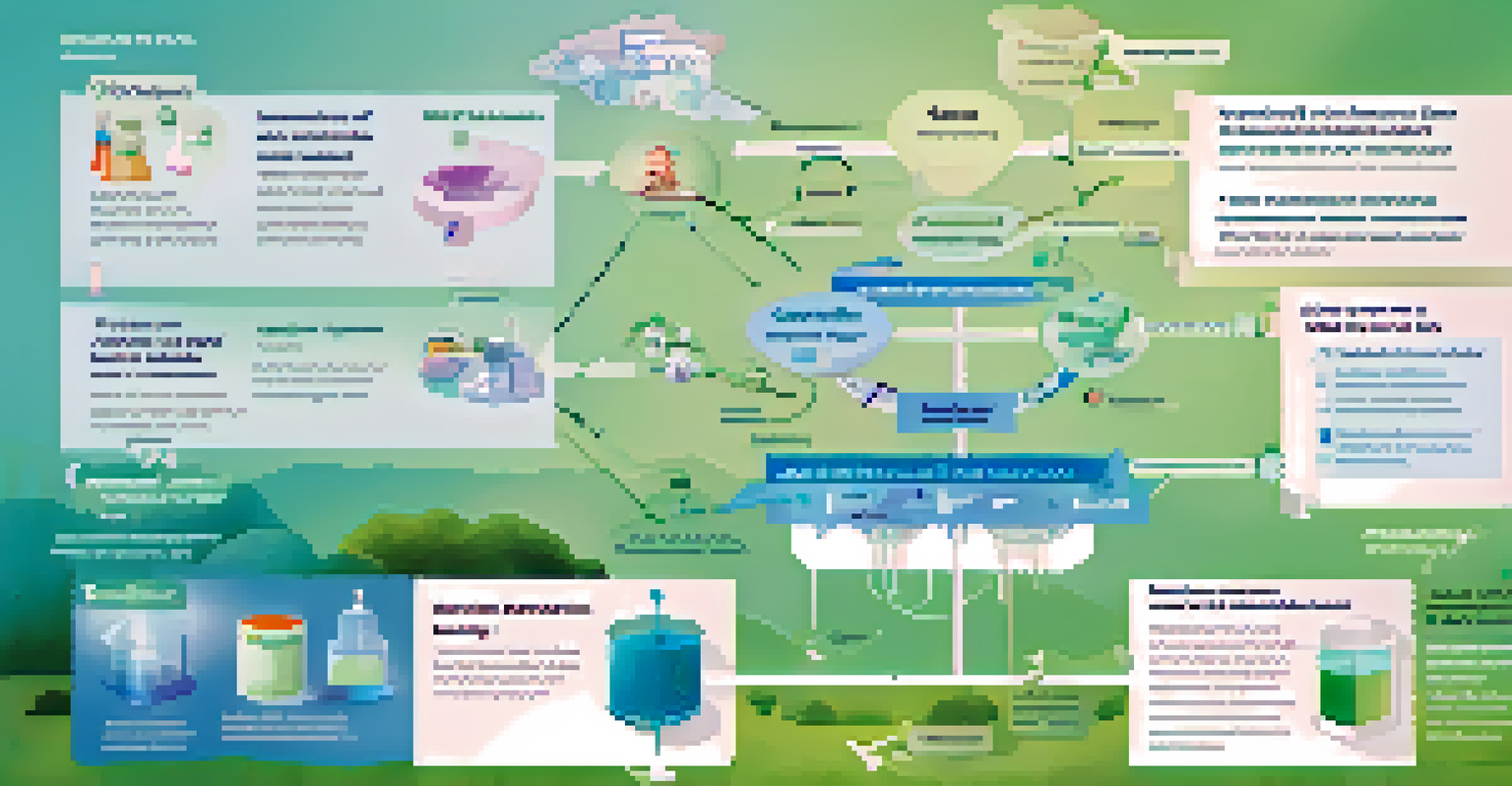Advancements in Gene Therapy: Transforming Hereditary Treatment

Understanding Gene Therapy: A Brief Overview
Gene therapy is an innovative approach that aims to treat or prevent diseases by directly altering genes within a patient's cells. This technique can involve replacing a faulty gene, inactivating a problematic gene, or introducing a new gene to help fight a disease. The goal is to correct the underlying genetic defects that cause health issues, offering a more targeted solution than traditional treatments.
Gene therapy is a revolutionary approach that has the potential to transform medicine and provide solutions that were once thought impossible.
For instance, imagine gene therapy as a software update for your computer, fixing bugs that cause it to malfunction. By correcting the genetic 'code,' scientists hope to restore normal function to cells that have been affected by diseases. This method holds promise for various hereditary conditions, from cystic fibrosis to hemophilia, and represents a significant shift in medical treatment.
As we delve deeper into the world of gene therapy, it's essential to understand its potential impact on patients and healthcare systems alike. With ongoing research and clinical trials, we're on the brink of a transformative era in medicine.
Recent Breakthroughs in Gene Therapy Techniques
Recent advancements in gene therapy techniques have significantly enhanced the effectiveness and safety of treatments. One notable innovation is the use of CRISPR-Cas9 technology, which allows for precise editing of genes. This revolutionary tool acts like a pair of molecular scissors, enabling scientists to cut out defective genes and replace them with healthy ones.

Think of CRISPR as a highly skilled editor working on a manuscript. It can identify errors and make necessary changes to improve the final product. This precision reduces the risk of unintended consequences, making gene therapy safer for patients. As researchers continue to refine these techniques, the possibilities for treating hereditary diseases expand rapidly.
Gene Therapy: A New Treatment Era
Gene therapy aims to treat diseases by directly altering genes, offering a more targeted solution than traditional methods.
Moreover, advancements in delivery systems, such as viral vectors, have improved the way therapeutic genes are introduced into the body. These developments are crucial for ensuring that gene therapy can be effectively implemented in clinical settings.
Success Stories: Transformative Cases of Gene Therapy
There are numerous success stories that showcase the potential of gene therapy in treating hereditary diseases. One inspiring example is the treatment of spinal muscular atrophy (SMA) with a gene therapy called Zolgensma. This therapy has shown remarkable results, leading to significant improvements in motor function in children diagnosed with this condition.
The future of gene therapy holds the promise not only of treating genetic diseases but also of altering the very fabric of human health.
Imagine a child who once struggled to sit up or crawl, suddenly gaining the strength to play and interact with their peers. Zolgensma has not only changed individual lives but has also sparked hope for many families facing similar challenges. Such success stories highlight the real-world impact of these advancements and the hope they bring to families affected by genetic disorders.
Another noteworthy case involves gene therapy for inherited retinal diseases, where patients have experienced restored vision. These instances underscore the transformative power of gene therapy and its potential to redefine health outcomes for countless individuals.
Regulatory Landscape: Navigating Gene Therapy Approval
As gene therapy continues to evolve, navigating the regulatory landscape is crucial for its successful implementation. Regulatory agencies like the FDA in the United States play a vital role in ensuring that gene therapies are safe and effective before they reach the market. This involves rigorous clinical trials and comprehensive reviews to evaluate the benefits and risks associated with new treatments.
Think of regulatory agencies as gatekeepers in a bustling marketplace. They assess the quality of goods before allowing them to be sold to consumers. The same principle applies to gene therapies, where thorough scrutiny helps protect patients from potential harm. This process can sometimes slow down the introduction of new therapies, but it is essential for maintaining high standards of safety.
CRISPR: Precision in Gene Editing
CRISPR technology serves as a precise tool for editing genes, enhancing the safety and effectiveness of gene therapy.
As the field of gene therapy matures, ongoing dialogue between researchers, healthcare providers, and regulators will be crucial for fostering innovation while ensuring patient safety.
Ethical Considerations in Gene Therapy Research
With great advancements come great responsibilities, and gene therapy is no exception. Ethical considerations are paramount in this field, particularly regarding genetic modifications that could be passed down to future generations. Discussions around the implications of 'designer babies' and altering human DNA raise important questions about morality and the nature of human intervention in genetics.
Imagine standing at a crossroad, where one path leads to remarkable advancements in curing diseases, while the other raises concerns about potential misuse. Navigating this landscape requires thoughtful dialogue among scientists, ethicists, and the public. Transparency in research and open discussions about ethical implications can help ensure that gene therapy is pursued responsibly.
Moreover, informed consent is critical when conducting clinical trials involving gene therapy. Patients must fully understand the risks and benefits before participating, ensuring that their rights and autonomy are respected throughout the process.
Future Prospects: The Next Frontier in Gene Therapy
Looking ahead, the future of gene therapy is filled with exciting possibilities. Researchers are exploring ways to expand the range of treatable conditions, including rare genetic disorders and even certain types of cancer. The goal is to develop therapies that are not only effective but also accessible and affordable for patients worldwide.
Picture a world where genetic diseases are no longer a life sentence but rather treatable conditions, much like how we manage chronic illnesses today. This vision is becoming increasingly attainable as technological innovations continue to emerge. The potential to create personalized gene therapies tailored to an individual's unique genetic makeup is also on the horizon.
Ethics and Future of Gene Therapy
As gene therapy advances, ethical considerations and public awareness are essential for responsible research and implementation.
Furthermore, collaboration among scientists, healthcare providers, and policymakers will be essential in driving these advancements forward. By working together, we can pave the way for a future where gene therapy becomes a standard option in the treatment of hereditary diseases.
The Role of Public Awareness in Gene Therapy
Public awareness plays a crucial role in the acceptance and implementation of gene therapy. As new treatments emerge, educating the public about the benefits and risks associated with gene therapy is vital for informed decision-making. This includes addressing misconceptions and providing accurate information about the science behind these advancements.
Consider public awareness as the foundation of a strong building; without it, the structure may crumble. By fostering understanding and trust in gene therapy, we can encourage more patients to consider it as a viable treatment option. Engaging community discussions, informative resources, and outreach programs can help demystify the process and promote acceptance.

Moreover, as patients become more informed, they can advocate for their own health needs, leading to improved outcomes. Empowering individuals with knowledge is key to unlocking the full potential of gene therapy in transforming hereditary treatment.